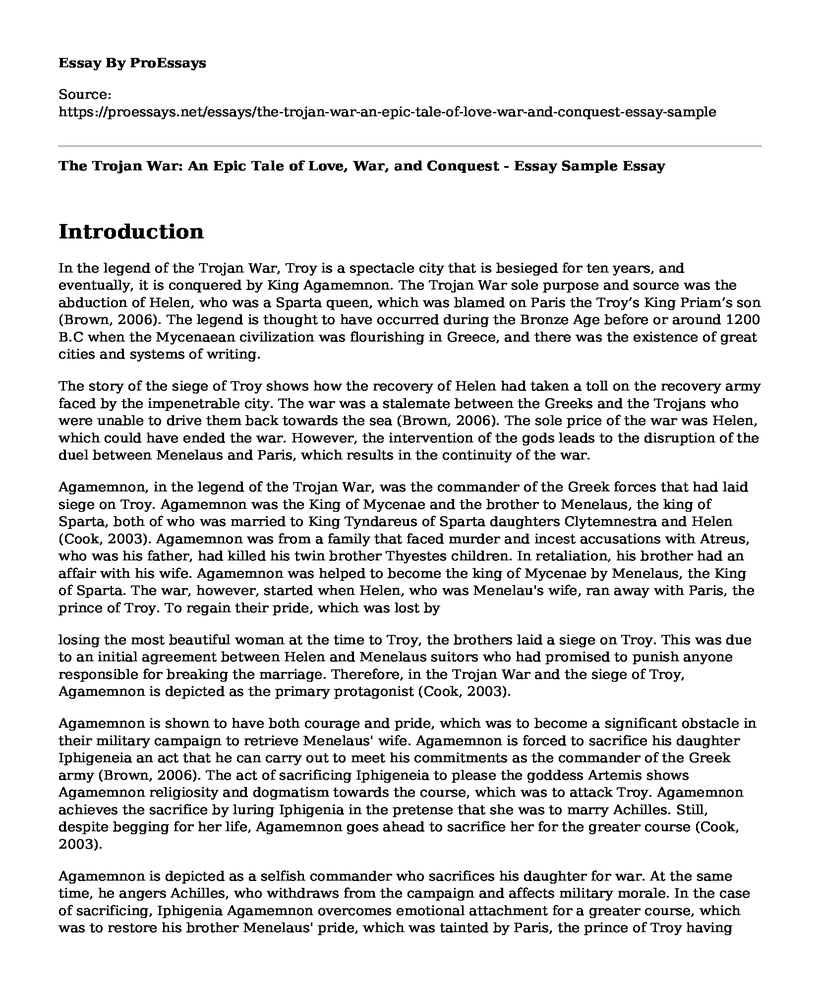Introduction
In the legend of the Trojan War, Troy is a spectacle city that is besieged for ten years, and eventually, it is conquered by King Agamemnon. The Trojan War sole purpose and source was the abduction of Helen, who was a Sparta queen, which was blamed on Paris the Troy’s King Priam’s son (Brown, 2006). The legend is thought to have occurred during the Bronze Age before or around 1200 B.C when the Mycenaean civilization was flourishing in Greece, and there was the existence of great cities and systems of writing.
The story of the siege of Troy shows how the recovery of Helen had taken a toll on the recovery army faced by the impenetrable city. The war was a stalemate between the Greeks and the Trojans who were unable to drive them back towards the sea (Brown, 2006). The sole price of the war was Helen, which could have ended the war. However, the intervention of the gods leads to the disruption of the duel between Menelaus and Paris, which results in the continuity of the war.
Agamemnon, in the legend of the Trojan War, was the commander of the Greek forces that had laid siege on Troy. Agamemnon was the King of Mycenae and the brother to Menelaus, the king of Sparta, both of who was married to King Tyndareus of Sparta daughters Clytemnestra and Helen (Cook, 2003). Agamemnon was from a family that faced murder and incest accusations with Atreus, who was his father, had killed his twin brother Thyestes children. In retaliation, his brother had an affair with his wife. Agamemnon was helped to become the king of Mycenae by Menelaus, the King of Sparta. The war, however, started when Helen, who was Menelau's wife, ran away with Paris, the prince of Troy. To regain their pride, which was lost by
losing the most beautiful woman at the time to Troy, the brothers laid a siege on Troy. This was due to an initial agreement between Helen and Menelaus suitors who had promised to punish anyone responsible for breaking the marriage. Therefore, in the Trojan War and the siege of Troy, Agamemnon is depicted as the primary protagonist (Cook, 2003).
Agamemnon is shown to have both courage and pride, which was to become a significant obstacle in their military campaign to retrieve Menelaus' wife. Agamemnon is forced to sacrifice his daughter Iphigeneia an act that he can carry out to meet his commitments as the commander of the Greek army (Brown, 2006). The act of sacrificing Iphigeneia to please the goddess Artemis shows Agamemnon religiosity and dogmatism towards the course, which was to attack Troy. Agamemnon achieves the sacrifice by luring Iphigenia in the pretense that she was to marry Achilles. Still, despite begging for her life, Agamemnon goes ahead to sacrifice her for the greater course (Cook, 2003).
Agamemnon is depicted as a selfish commander who sacrifices his daughter for war. At the same time, he angers Achilles, who withdraws from the campaign and affects military morale. In the case of sacrificing, Iphigenia Agamemnon overcomes emotional attachment for a greater course, which was to restore his brother Menelaus' pride, which was tainted by Paris, the prince of Troy having eloped with Helen (Brown, 2006). For all the sacrifices, Agamemnon is made the commander the coalition forces, which was a significant triumph and a depiction of duty triumph over personal attachment.
References
Brown, H. P. (2006). Addressing Agamemnon: A Pilot Study of Politeness and Pragmatics in the" Iliad." Transactions of the American Philological Association (1974), 1-46.
Cook, E. F. (2003). Agamemnon's Test of the Army in Iliad Book 2 and the Function of Homeric Akhos. American Journal of Philology, 124(2), 165-198.
Cite this page
The Trojan War: An Epic Tale of Love, War, and Conquest - Essay Sample. (2023, Aug 01). Retrieved from https://proessays.net/essays/the-trojan-war-an-epic-tale-of-love-war-and-conquest-essay-sample
If you are the original author of this essay and no longer wish to have it published on the ProEssays website, please click below to request its removal:
- How Lee Ostwald Killed JF Kennedy
- The Great Depression and the New Deal Experiment - Paper Example
- Racism, Colonization, and Civilization Essay
- Essay Sample on John Brown's Harpers Ferry Raid: His Fight Against Slavery and the Impact Today
- Jewish Brigade Group: WWII Yishuv Jews' Heroic Contributions - Research Paper
- Essay Sample on American Civil War: Causes & Consequences
- Essay Sample on Orange Story & Farewell: WWII Internment Camps & Japanese-American Struggle







